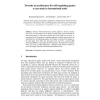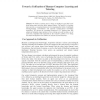19 search results - page 3 / 4 » Affect and Mental Engagement: Towards Adaptability for Intel... |
AIED
2005
Springer
13 years 11 months ago
2005
Springer
A student's goals and attitudes while interacting with a tutor are typically unseen and unknowable. However their outward behavior (e.g. problem-solving time, mistakes and hel...
EDM
2010
13 years 7 months ago
2010
Intelligent tutoring systems adapt to users' cognitive factors, but typically not to affective or conative factors. Crowd-sourcing may be a way to create materials that engage...
ATAL
2009
Springer
13 years 7 months ago
2009
Springer
Abstract--Norm-enforcement models applied in human societies may serve as an inspiration for the design of multi-agent systems. Models for norm-enforcement in multi-agent systems o...
ITS
1998
Springer
13 years 10 months ago
1998
Springer
We define a learning tutor as being an intelligent agent that learns from human tutors and then tutors human learners. The notion of a learning tutor provides a conceptual framewor...
ATAL
2006
Springer
13 years 10 months ago
2006
Springer
Intelligent software personal assistants for human organizations are an active research area within the multiagent community. However, while many capabilities for these software p...


